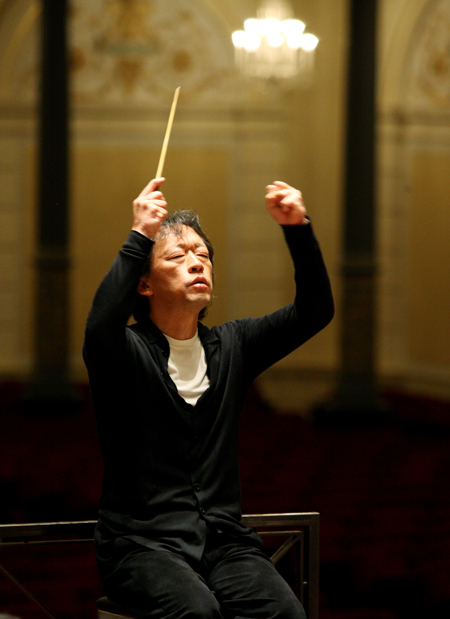Music to bridge cultures
 0 Comment(s)
0 Comment(s) Print
Print E-mail China Daily, April 26, 2013
E-mail China Daily, April 26, 2013
 |
|
[Photo/China Daily] |
"Like China itself, classical music has developed greatly. When I joined the orchestra seven years ago it was rare for people to buy tickets, despite the low price. But now our concerts are sold out, though the ticket prices are much higher. Audiences see it's worthwhile to pay for concerts."
With Chung as the driving force, the Seoul Philharmonic Orchestra signed an exclusive recording contract with Deutsche Grammophon, which has taken the orchestra to an international audience.
"Again, like in China, although we have top level soloists playing on the international stage, it's very hard for an orchestra to reach the top level. It's clear when you see the number of young people studying music in China today," he says. "The traditional idea in Asia is to have good skilled soloists rather than developing chamber music or orchestras."
When he came to the orchestra, which is South Korea's oldest, founded in 1948, he insisted on improving the facilities of the orchestra first, from food to chairs.
"If the musicians' chairs are poor, they are not given the proper respect," he says. "I often joke with my musicians, saying they should look forward to the day I retire. When I retire, I will make food for them."
As the sixth of seven children, Chung jokes that he listened to his brothers and sisters playing piano and violin before he was born.
He and his sisters, violinist Kyung-wha Chung and cellist Myung-wha Chung, used to perform together as the Chung Trio.
"I accompanied my sister when I began studying piano so I am not only a leader in an orchestra but also a good accompanist," he says.
Now, together with Chin, Chung says he has two main responsibilities with the orchestra: bringing in great soloists and helping the young musicians.
Shi-Yeon Sung, 33, is the associate conductor of the Seoul Philharmonic Orchestra, and is considered "one of the most exciting young conductors on the international scene" by Chung.
"Chung doesn't teach me much about technique but tells me about his musical ideas, which is very inspiring," says Sung, who made her formal conducting debut in 2002, conducting Die Zauberflote in Berlin.
The annual Arts Nova series of public events, which highlight contemporary experimentation in classical music under Chin, give audiences a closer look at music.
"There are many young talents who deserve a chance to emerge from the background," Chin says.
"For musicians, we are always trying to help people through music," says Chung, referring to both public music educational events and charity events, such as helping in the aftermath of the Wenchuan earthquake in 2008. When the Japan tsunami happened in 2011, he led the orchestra to perform there.






Go to Forum >>0 Comment(s)